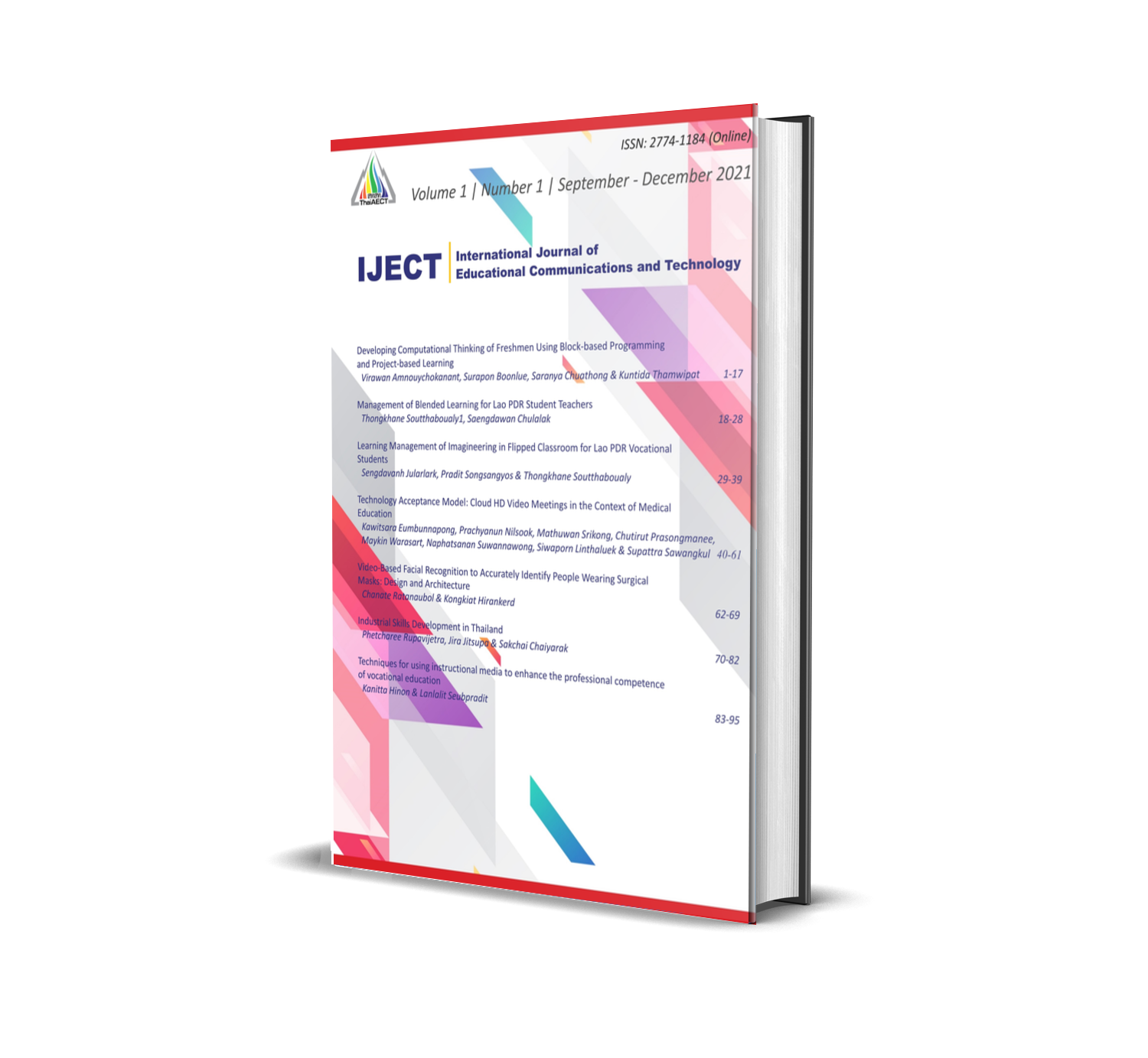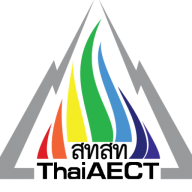Digital Learning Space Management for Digital Nomad
Keywords:
Learning environment, Digital Space Learning, Digital NomadAbstract
The aim of this paper is to provide a model for developing and managing learning spaces and for creating a digital educational environment for promoting and supporting Digital Nomads. This relates to fostering a model of the digital economy that is driven by information and communication technology involving basic online processes through data synthesis and the creation of connections. Another aim is to create a Digital Learning Space (DLS) model, which could involve the use of digital technology to increase efficiency and create added value in terms of Thailand’s economic activities. This model can support decision-making on the part of executives or those who are responsible for formulating policies that will develop and promote the expansion of Digital Nomad activity and encourage digital transformation in the economy, society, industry, tourism and politics
References
Agasisti, T., Frattini, F., & Soncin, M. (2020). Digital innovation in times of emergency: Reactions from a school of management in Italy. Sustainability (Switzerland), 12(24), 1–17. https://doi.org/10.3390/su122410312
Ahlberg, E., & Stenström, K. (n.d.). The Development of the Digital Nomad During the Course of the Pandemic Title: The Development of the Digital Nomad During the Course of the Pandemic.
Bygstad, B., Øvrelid, E., Ludvigsen, S., & Dæhlen, M. (2022). From dual digitalization to digital learning space: Exploring the digital transformation of higher education. Computers and Education, 182, 104463. https://doi.org/10.1016/j.compedu.2022.104463
Carrasco-Sáez, J. L., Butter, M. C., Badilla-Quintana, M. G., Pérez, L. J., & Farfán, J. M. (2019). Sociological importance and validation of a questionnaire for the sustainability of personal learning environments (PLE) in 8th grade students of the Biobío Region in Chile. Sustainability (Switzerland), 11(5). https://doi.org/10.3390/su11051301
Chang, M. C. L., Huang, Y. H., Lin, W. C., & Sun, S. W. (2021). Digital Fabrication: Machine Learning-based Immersive Experiencing for the Virtual Space in a Future Museum. Proceedings - 2021 4th IEEE International Conference on Artificial Intelligence and Virtual Reality, AIVR 2021, 102–105. https://doi.org/10.1109/AIVR52153.2021.00024
de Almeida, M. A., Correia, A., Schneider, D., & de Souza, J. M. (2021). COVID-19 as Opportunity to Test Digital Nomad Lifestyle. Proceedings of the 2021 IEEE 24th International Conference on Computer Supported Cooperative Work in Design, CSCWD 2021, 1209–1214. https://doi.org/10.1109/CSCWD49262.2021.9437685
Djeki, E., Degila, J., Bondiombouy, C., & Alhassan, M. H. (2021). Security Issues in Digital Learning Spaces. 2021 IEEE International Conference on Computing, ICOCO 2021, 71–77. https://doi.org/10.1109/ICOCO53166.2021.9673575
Fahmy Hidayat, A., Dwi Jatmiko Suwawi, D., & Ayu Laksitowening, K. (2020). Learning Content Recommendations on Personalized Learning Environment Using Collaborative Filtering Method; Learning Content Recommendations on Personalized Learning Environment Using Collaborative Filtering Method. 1-6. https://doi: 10.1109/ICoICT49345.2020.9166371
Frick, N., & Marx, J. (2021). Integrating digital nomads in corporate structures: Managerial contemplations. Proceedings of the Annual Hawaii International Conference on System Sciences, 2020-January, 2111–2120. https://doi.org/10.24251/hicss.2021.260
Gambo, Y., & Shakir, M. Z. (2021, March 14). WIP: Model of Self-Regulated Smart Learning Environment. EDUNINE 2021 - 5th IEEE World Engineering Education Conference: The Future of Engineering Education: Current Challenges and Opportunities, Proceedings. https://doi.org/10.1109/EDUNINE51952.2021.9429090
Gridchina, N., & Zavyalov, S. (2021). Distance learning technologies and digital learning in the legal field of the educational environment. Problems and prospects. Proceedings - 2021 1st International Conference on Technology Enhanced Learning in Higher Education, TELE 2021, 321–324. https://doi.org/10.1109/TELE52840.2021.9482445
Gupta, A., Roy, P. P., & Dutt, V. (2021). Evaluation of Instance-Based Learning and Q-Learning Algorithms in Dynamic Environments. IEEE Access, 9, 138775–138790. https://doi.org/10.1109/ACCESS.2021.3117855
Jarrahi, M. H., Philips, G., Sutherland, W., Sawyer, S., & Erickson, I. (2019). Personalization of knowledge, personal knowledge ecology, and digital nomadism. Journal of the Association for Information Science and Technology, 70(4), 313–324. https://doi.org/10.1002/asi.24134
Jin, D., Yu, Z., Jiao, P., Pan, S., He, D., Wu, J., Yu, P., & Zhang, W. (2021). A Survey of Community Detection Approaches: From Statistical Modeling to Deep Learning. IEEE Transactions on Knowledge and Data Engineering, 1–1. https://doi.org/10.1109/tkde.2021.3104155
Kümmel, E., Moskaliuk, J., Cress, U., & Kimmerle, J. (2020). Digital learning environments in higher education: A literature review of the role of individual vs. social settings for measuring learning outcomes. In Education Sciences (Vol. 10, Issue 3). MDPI AG. https://doi.org/10.3390/educsci10030078
Li, H., Su, Z., & Liu, X. (2020). Discriminative Multi-view latent Space learning based on Marginal Fisher Analysis. Proceedings - 8th International Conference on Digital Home, ICDH 2020, 178–183. https://doi.org/10.1109/ICDH51081.2020.00038
Mahanta, N., Prasaad, K. S., Sheeja, M. S., & Pattanayak, S. (2022). Impact of COVID-19 on Blended Learning Culture for Media Education in UAE. 1–5. https://doi.org/10.1109/aset53988.2022.9734858
Majeed, S., Uzair, M., Qamar, U., & Farooq, A. (2020, November 5). Social Network Analysis Visualization Tools: A Comparative Review. Proceedings - 2020 23rd IEEE International Multi-Topic Conference, INMIC 2020. https://doi.org/10.1109/INMIC50486.2020.9318162
Mathrani, A., Sarvesh, T., & Mathrani, S. (2020, December 16). Digital Gender Divide in Online Education during Covid-19 Lockdown in India. 2020 IEEE Asia-Pacific Conference on Computer Science and Data Engineering, CSDE 2020. https://doi.org/10.1109/CSDE50874.2020.9411378
Mogas, J., Palau, R., Fuentes, M., & Cebrián, G. (2021). Smart schools on the way: How school principals from Catalonia approach the future of education within the fourth industrial revolution. Learning Environments Research. https://doi.org/10.1007/s10984-021-09398-3
Moldavan, A. M., Edwards-Leis, C., & Murray, J. (2022). Design and pedagogical implications of a digital learning platform to promote well-being in teacher education. Teaching and Teacher Education, 115, 103732. https://doi.org/10.1016/j.tate.2022.103732
Mouratidis, G., & Jönsson, L.-E. (2018). Digital Nomadism Travel, Remote Work and Alternative Lifestyles. Master of Applied Cultural Analysis, Department of Arts and Cultural Sciences, Lund University.
Orel, M. (2021). Life is better in flip flops. Digital nomads and their transformational travels to Thailand. International Journal of Culture, Tourism, and Hospitality Research, 15(1), 3–9. https://doi.org/10.1108/IJCTHR-12-2019-0229
Seraji, F., Kasani, H. A., Abedi, H., & Sajedifard, M. (2020). Smart school project in Iran: Potentials and barriers. Education and Information Technologies. https://doi.org/10.1007/s10639-020-10173-9
Serrano-Iglesias, S., Gomez-Sanchez, E., & Bote-Lorenzo, M. L. (2021). Connecting formal and informal learning in smart learning environments. Proceedings - IEEE 21st International Conference on Advanced Learning Technologies, ICALT 2021, 439–441. https://doi.org/10.1109/ICALT52272.2021.00139
Shawkat, S., Zaidi Abd Rozan, M., Bt Salim, N., & Muhammad Faisal Shehzad, H. (2021). Digital Nomads: A Systematic Literature Review. International Conference on Research and Innovation in Information Systems, ICRIIS. https://doi.org/10.1109/ICRIIS53035.2021.9617008
Song, L., Lu, Z., & Petsangsri, S. (2020). Reconstruction of Smart Learning Space Based on Digital Twin (DT) Technology. Proceedings - 2020 7th International Conference on Dependable Systems and Their Applications, DSA 2020, 398–406. https://doi.org/10.1109/DSA51864.2020.00070
Tanabashi, S. (2021). Old Nishiki-e as Learning Tool for Contemporary Digital Object-based Learning in STEAM Education. Proceedings - 2021 International Symposium on Educational Technology, ISET 2021, 219–222. https://doi.org/10.1109/ISET52350.2021.00052
Tyutyuryukov, V., & Guseva, N. (2021). From remote work to digital nomads: Tax issues and tax opportunities of digital lifestyle. IFAC-PapersOnLine, 54(13), 188–193. https://doi.org/10.1016/j.ifacol.2021.10.443
Velentza, A. M., & Economou, E. (2020, July 15). Effects of Lighting Variations in Virtual Learning Environments. 11th International Conference on Information, Intelligence, Systems and Applications, IISA 2020. https://doi.org/10.1109/IISA50023.2020.9284416
Downloads
Published
How to Cite
Issue
Section
License
Copyright (c) 2022 International Journal of Educational Communications and Technology

This work is licensed under a Creative Commons Attribution-NonCommercial-NoDerivatives 4.0 International License.







